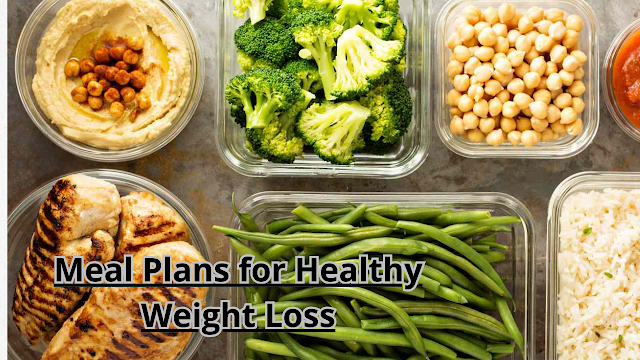This makes a good meal plan the very important backbone one needs to enable him or her to lose weight and become healthy, since it ensures that one takes all the necessary nutrients and proper portions of food with heavy consideration on how to follow the diet. This article will take you through some effective meal plans for healthy weight loss, meal preparation tips, examples of well-balanced meals, and also strategies to help you keep on track.
1. Balanced Meals Explained
Components of a Balanced Meal: A balanced meal should include all types of food groups that will feed your body with nutritious needs and keep you full.
Key Components:
Lean Proteins: Add in chicken, fish, tofu, or legumes to take care of the muscle mass and the other satiety needs.
Whole Grains : Add some whole grains, like quinoa, brown rice, or even whole-wheat bread, to maintain constant energy flow and have a lot of fiber.
Fruits and Vegetables: Fill half your plate with a rainbow of fruits and vegetables. They have different, essential vitamins along with minerals and antioxidants.
Healthy Fats: Add good fats like avocado, nuts, and olive oil for heart health and fullness.
2. Creating a Meal Plan for the Week
Meal Planning Steps: Planning how you're going to eat this week gives you direction in grocery shopping and, subsequently, truly helps you stick to your weight loss regimen.
Steps for meal planning:
Define weight-loss goals and know how many meals you need to make for the week.
Pick a meal: These are great recipes that work with lean proteins, whole grains, and plenty of fruits and vegetables. The meal should really be simple to prepare and should work with your dietary requirements.
Develop a Shopping List: Finally, take the ingredient list that you are going to require for the week. You may prepare them by category in order to keep your shopping trip simple.
Prep Ahead Prep some of your meals or elements of your meals ahead, whether that be by chopping up veggies, cooking the grains, or grilling proteins in advance. Then store your prepped foods in the refrigerator or freezer for easy access.
3. Sample Meal Plan for Weight Loss
Sample Meal Plan: Such a sample meal plan is for healthy weight loss whereby an individual is guided on the number of servings required of balanced, nutrient-dense food.
Breakfast: Greek Yogurt with fresh berries, a sprinkle of granola, drizzle of honey, and green tea on the side.
LUNCH: Salad with grilled chicken, assorted greens, halved cherry tomatoes, sliced cucumbers, diced avocado, and a light vinaigrette dressing along with a side of Greek yogurt and honey. Whole-grain roll or small-file portion of quinoa.
Snack A few pieces of almonds or a piece of fruit, eg, apple, banana Main Meal Baked salmon, steamed broccoli, roasted sweet potatoes, and side salad with lemon-tahini dressing. Evening Snack Include a few slices of cucumber or small portion of hummus with some carrot sticks.
4. Tips to Keep Going Regularity is the Magic Key A meal plan will only be effective if you stick with it all the way. Practical Advice
Stay Hydrated: Drink water to keep your body well hydrated and support your body metabolism.
Don't Skip Meals: Eating regular meals and snacks keeps the furnace of your body metabolism stoked and combats eating too much later on.
Monitor Portions: You can watch your portion size by using measuring cups and food scales to help prevent you from overeating.
Be Flexible: Include some occasional treats or a deviation from the meal plan to prevent feelings of deprivation and demonization of food.
5. Adaptations to the Plan Tailoring Your Meal Plan: Tailoring of your meal plan according to the really feel, success, and likeness and dis-likeness of foods
Changing the Plan:
Monitoring and Review: Review your meal plan occasionally for its effectiveness and adopt amendments to cater to growing demands.
Take Advice from the Pros: A dietitian or nutritionist will customize your food plan based on individual needs of your body.
Stay Aware: Notice the requirements of the body and the energy fluctuation to change the size of the meal or its components.
Thus, a properly balanced meal plan is the nutritional key to healthy weight loss. Balance, preplanning, consistency, and adjustments are bound to offer effective leverages over weight in congruence with health goals. Given proper preparation and will, a well-built meal plan can assure long-term success and optimal overall health.
